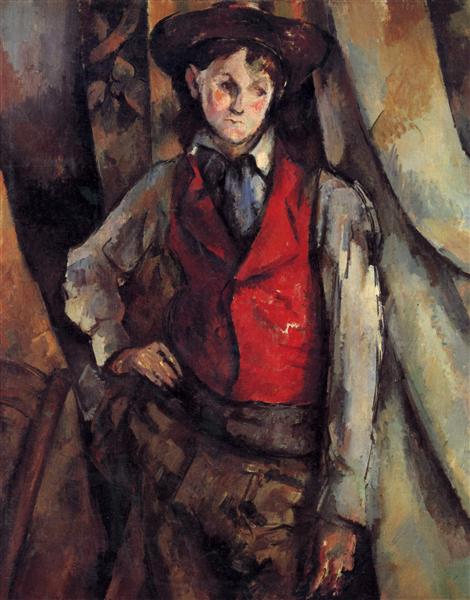Descrição
Paul Cézanne's "Boy in a Red Waistcoat", painted in 1888, invites us into a profound dialogue about the fusion of form, color and emotionality in the child portrait. In this painting, Cézanne captures the essence of a child who, dressed in a vibrant red waistcoat, is presented as a subject in the intimacy of a familiar environment. The choice of red is not merely decorative; it acts as the focal point that draws our attention, highlighting not only the child, but also suggesting a vibrant life energy emanating from his presence.
The composition is characteristic of Cézanne's post-impressionist style, where objective representation meets a subjective exploration of colour and form. The background is a clear example of how the artist employs simplified forms and modulated colours to create a space, which although indistinct and nebulous, feels in tune with the figure of the child. This stylistic choice allows the viewer to focus on the central figure while at the same time feeling part of the environment around him.
The use of natural light in the painting is another key aspect that deserves mention. The light seems to envelop the boy in a way that highlights both the contours of his waistcoat and the shadows that unfold around him. Cézanne experimented with tonal variations and the interplay of colour, bringing this static depiction to life. Through his technique of short, interlocking brushstrokes, he achieves a sense of three-dimensionality that pops out from the canvas, making the figure seem almost palpitable.
In this portrait, the child is not just a subject; he is a symbol of the purity and innocence of childhood. His facial expression, though serene and almost introspective, suggests an inner world rich in thoughts and emotions. Cézanne, through his ability to capture fleeting moments, manages to convey an emotional connection with the viewer. Their gazes meet; a shared silence is established in the space of the painting, suggesting a reflection on the passage of time and the experience of childhood.
Cézanne is known for his influence on the transition between Impressionism and Cubism, and Boy in a Red Waistcoat is a clear reflection of this. The work does not conform to a single perspective, but instead plays with the idea of multiple visual layers that invite exploration. This result is a testament to the artist's attempt to challenge the conventions of visual representation of his time, leading us to contemplate not only what is in plain sight, but also what lies beneath.
In exploring the identity of the child, Cézanne offers us an evocation of universal childhood, a theme that has fascinated generations of artists. As in his other works where he explores the human figure, such as "The Card Player" or "The Woman with a Hat", this canvas reflects his constant search for a new pictorial language that breaks with convention and captures the essence of his subjects in an innovative way.
"Boy in a Red Waistcoat" is more than a portrait; it is an invitation to explore the complexity of childhood through Cézanne's masterful eye. Each stroke and shade of color brings us closer to a richer understanding of what it means to be human in the context of everyday life. Thus, the work stands as a fundamental piece in the corpus of post-impressionist art, consolidating Cézanne's relevance as a pioneer in the evolution of modern art.
KUADROS ©, a famous painting on your wall.
Hand-made oil painting reproductions, with the quality of professional artists and the distinctive seal of KUADROS ©.
Painting reproduction service with satisfaction guarantee. If you are not completely satisfied with the replica of your painting, we will refund 100% of your money.

